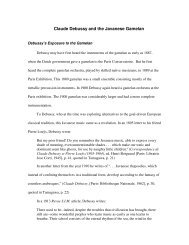Music Preference 1 - Brent Hugh's personal and business web pages
Music Preference 1 - Brent Hugh's personal and business web pages
Music Preference 1 - Brent Hugh's personal and business web pages
Create successful ePaper yourself
Turn your PDF publications into a flip-book with our unique Google optimized e-Paper software.
<strong>Music</strong> <strong>Preference</strong> 19<br />
is the hardening of attitude over time necessary in order to develop refined knowledge? Three<br />
reasons are apparent; the basis for all three is the insight given by the neural-network model of<br />
learning: the purpose of attitudes is to determine how information is processed <strong>and</strong> turned into<br />
knowledge.<br />
1. Attitude affects interest <strong>and</strong> interest affects knowledge. A listener equally interested in<br />
every different kind of music would not have time or mental capacity even to listen in detail to<br />
each of the thous<strong>and</strong>s of musical styles that have existed in world history. In order to develop<br />
detailed knowledge, a few styles must be relatively preferred <strong>and</strong> the remainder relatively<br />
neglected. Time <strong>and</strong> effort is put into listening to <strong>and</strong> gaining underst<strong>and</strong>ing of the preferred<br />
styles; the result is a more detailed knowledge of the preferred styles <strong>and</strong> a less detailed<br />
knowledge of the non-preferred styles. Early in life when the basic discrimination between music<br />
<strong>and</strong> non-music is learned, strong preferences are not necessary or helpful; listening to any kind of<br />
music will do. On the other end of the spectrum, a musician learning to make fine distinctions<br />
among, say, the early, middle, <strong>and</strong> late periods of Beethoven's piano music, between the musical<br />
styles of Palestrina <strong>and</strong> Vittoria, or between Heavy Metal <strong>and</strong> Gothic Metal, must do<br />
considerable listening to a small segment of the musical repertoire. Without strong interests <strong>and</strong><br />
preferences to guide this listening, the necessary focused listening <strong>and</strong> learning would not take<br />
place.<br />
2. Attitude affects cognition. One of the primary functions of the brain is to filter the welter<br />
of sensory <strong>and</strong> perceptual input that continually inundate it, choosing the few perceptions of<br />
highest interest <strong>and</strong> importance to pass along to the areas of higher brain function. Further<br />
processing is done to filter some perceptions into short-term memory <strong>and</strong> reject others, <strong>and</strong> yet<br />
further processing to filter some contents of short-term memory into long-term memory <strong>and</strong>





